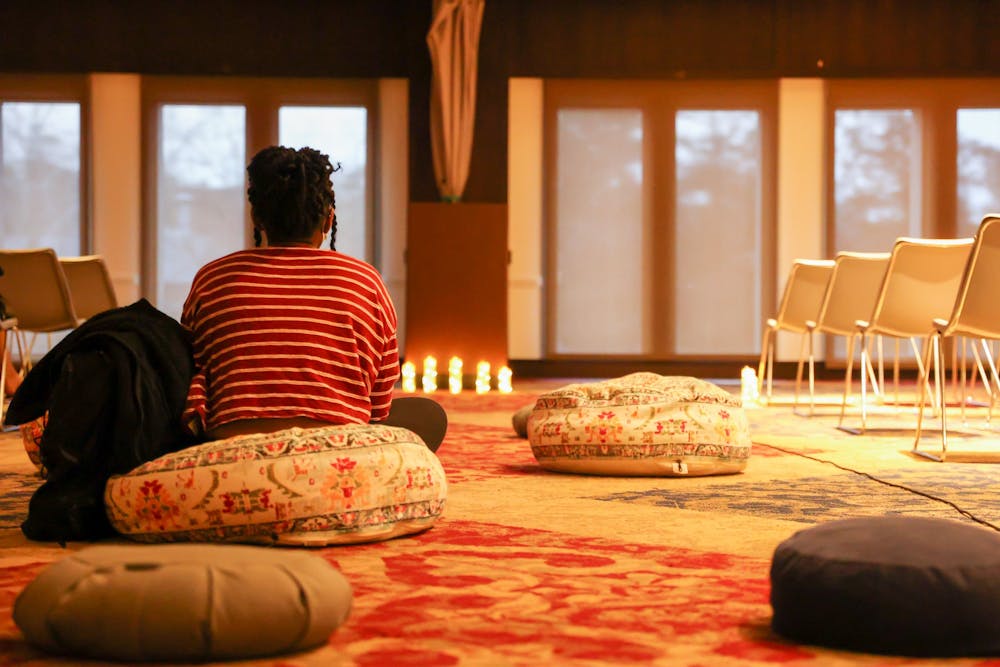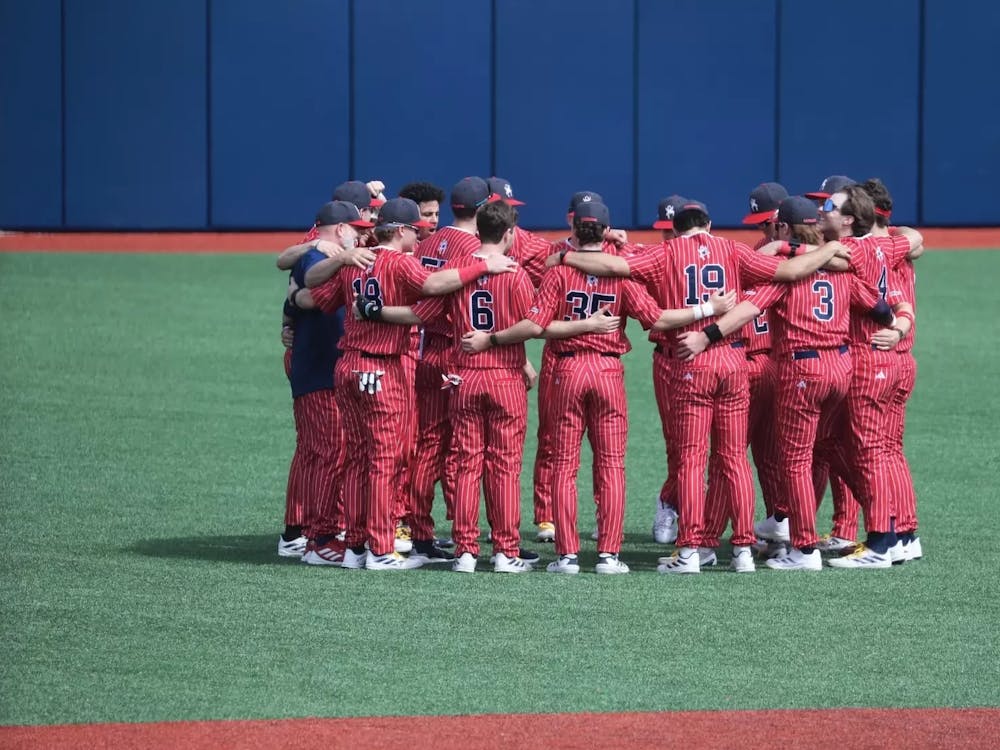Editor's note: Confidential sexual assault resources for UR students include CARE Advocates, which can be reached at advocate@richmond.edu or 804.801.6251; Peer Sexual Misconduct Advisors (PSMA), at psma@richmond.edu or 804.346.7674; CAPS, at CAPS@richmond.edu or 804.289.8119; Virginia LGBTQ Partner Abuse and Sexual Assault Helpline (24/7), at 866.356.6998; Greater Richmond Regional Hotline (24/7), at 804.612.6126; National Sexual Assault Hotline (24/7) at 800.656.HOPE.
Students gathered in the University of Richmond Forum on the evening of April 4 for the first in-person Take Back the Night event in two years, the silence of the night broken as survivor after survivor shared their accounts of sexual assault.
Take Back the Night, a movement that began in the 1970s to combat sexual and interpersonal violence, allows members of the UR community to share their stories about how sexual violence has impacted their life or stand in solidarity with survivors, according to the Center for Awareness, Response and Education website.
What started as long periods of solemn silence ended with around a dozen survivors of sexual assault sharing their stories at the event.
“We are very proud of the resilience we were able to see from our students impacted by sexual violence and their allies,” the Peer Sexual Misconduct Advisors wrote to The Collegian.
This year, Take Back the Night was organized by PSMAs, CARE and UR Well.
On our campus and campuses across the country, the event has historically taken place at night to serve as a metaphor to reclaim the night from those who have violated the safety of student survivors and their allies, according to the PSMAs.
Take Back the Night is part of a larger program for Sexual Assault Awareness Month at UR, aiming to raise awareness about sexual violence, teach the campus community how to prevent it and support survivors, according to the website.
The event was broken up into two speak-outs, one inside the Alice Haynes Room in Tyler Haynes Commons at 6:45 p.m. and another in the Forum at 8:15 p.m. The CARE office and PSMAs collectively made the decision to have two locations this year because they received feedback from past years that some survivors had felt more comfortable sharing their stories in an indoor space and others in an outdoor space, according to the PSMAs.
“We wanted to be able to provide multiple spaces to ensure the comfort and safety of every survivor,” they wrote.
Choeur du Roi, a UR all-gender a capella group, began both speak-outs with performances of “Praying,” by Kesha. The lyrics reflected the message of the evening, eliciting themes of strength and triumphing through hardship.
Senior Sam Mickey, CARE assistant for program support, introduced the indoor speak-out by informing the attendees about the confidential resources available and providing a content warning. They expressed a running theme of the night that every experience was valid and this was a space of support.
Enjoy what you're reading?
Signup for our newsletter
“It is so tempting to invalidate our own experiences…” Mickey said. “But the fact is, we are all here because either we ourselves or someone we know was impacted by interpersonal violence.”
Dimly lit with faux candlelight, around 15 students were spread out in chairs in the Alice Haynes Room for the inside speak-out portion of the event. Students left by themselves and in pairs as the room enveloped in silence.
I think there’s a huge underrepresentation of people here who have experienced sexual assault on our campus, one speaker said.
One other person spoke, and the rest of the time was filled with a somber silence, only interrupted by Mickey reading anonymous submissions that survivors had sent in through a Google Form prior to the event.
A CAPS intern drew the indoor speak-out to a close with a grounding exercise, leading the remaining attendees through calming breathing techniques and time for reflection.
The event transitioned to the center of the forum around 8 p.m., when dozens of students began to gather underneath the tent.
It was several minutes before the first speaker went up to the lectern, but as the night went on, the pauses between speakers grew shorter as survivors garnered courage from those who took the mic before them.
Many of the speakers said they hadn’t planned on talking, but that hearing the stories of other survivors had inspired them to share their own. Speakers expressed that every experience was valid, which other survivors said had inspired them to stand in front of the crowd as well.
After a survivor shared their story, a PSMA would approach them, offering tissues and a slip of paper with confidential support resources. PSMAs, CARE advocates and CAPS doctoral interns also had private rooms reserved on the third floor of Tyler Haynes Commons to chat with anyone who needed them, Mickey said.
As the night drew to a close, survivors and allies alike embraced in comforting hugs. The otherwise empty Forum was filled only with the whispers of encouragement as students congregated beneath the tent, sheltered from the cool night.
Contact news editor Natasha Sokoloff at natasha.sokoloff@richmond.edu.
Support independent student media
You can make a tax-deductible donation by clicking the button below, which takes you to our secure PayPal account. The page is set up to receive contributions in whatever amount you designate. We look forward to using the money we raise to further our mission of providing honest and accurate information to students, faculty, staff, alumni and others in the general public.
Donate Now



